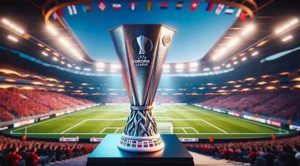
The Europa cup . image courtesy
The intricate web of European football competitions is not just about what happens on the pitch but also the complex ownership structures that govern some of the continent’s biggest clubs. With Manchester United and Nice both having ties to INEOS, a recent development in the ownership landscape has raised questions about which European competition these clubs will participate in next season.
The situation, as reported by The Telegraph, suggests that an independent panel may need to intervene within the next week to determine the fate of Manchester United and Nice in European competitions. Given the shared ownership, there are concerns about conflicts of interest and potential violations of UEFA regulations regarding multiple club ownership.
According to the report, there is speculation that if one team is to miss out on a European competition spot, it will likely be Manchester United, facing the possibility of relegation to the UEFA Europa Conference League. However, historical precedents indicate that compromises have been reached in similar situations in the past.

Manchester united players lifting the FA cup after knocking Manchester city to secure European football next season. Photo courtesy
The article points out instances where clubs with shared ownership, such as Brighton and Manchester City, have navigated similar challenges in European competitions. While concerns about undue influence and control over multiple clubs persist, past resolutions have typically involved finding a balance to ensure fair competition.
Moreover, the report highlights the growing acceptance within UEFA of multi-club ownership arrangements. UEFA President Aleksander Čeferin has acknowledged the evolving landscape of football ownership, suggesting that compromises will likely be reached to accommodate such structures.
Despite the looming deadline, there is optimism that a resolution will be reached before the start of the next season. The confidence from the INEOS camp suggests that they are actively working towards finding a compromise that satisfies UEFA regulations while allowing both Manchester United and Nice to participate in European competitions.
The significance of Manchester United’s participation in European football cannot be understated. As one of the most storied clubs in the world, their presence in UEFA competitions adds prestige and commercial value to the tournaments. Any exclusion of Manchester United from European competitions would be a significant loss for UEFA, particularly as they look to revamp and rebrand competitions like the Europa League.
In conclusion, while the ownership complications between Manchester United and Nice present a unique challenge, there is confidence that a compromise will be reached in time for the upcoming season. The stakes are high, not just for the clubs involved but for UEFA and the broader landscape of European football. As negotiations continue behind the scenes, fans will eagerly await the final verdict that will determine the European destiny of these iconic clubs.
By Anthony Juma
